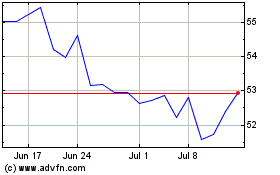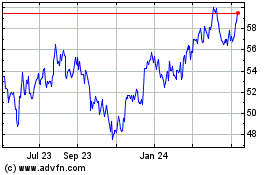U.S. stock investors are looking to quarterly earnings results,
which ramp up next week, as a distraction from Europe's debt
wrangling and reason to extend the past week's gains.
Alcoa Inc. (AA) makes the unofficial kickoff to third-quarter
earnings reports, with a release late Tuesday. J.P. Morgan Chase
& Co. (JPM) and Google Inc. (GOOG) are scheduled to report
Thursday.
Results from the trio should offer investors a sense of whether
companies have been able to override the economic and political
challenges of the past three months, which have made some companies
and consumers more reluctant to spend.
The major stock indexes ended the week up about 2%. But they are
down 13% to 15% from their April highs, pummeled by prospects of a
sovereign-debt default in Europe and fears of a double-dip U.S.
recession.
"Stocks will recover from earnings for the time being, but I
don't believe it'll be a new bull market long term," said Keith
Springer, president of Springer Financial Advisors. "I simply feel
sentiment has swung so far negative that it's not going to be hard
to beat it on the upside. People are just ready to jump off a
cliff."
Also next week, reports on September U.S. retail sales and
October consumer sentiment will provide more insight into how
consumers are faring. The Federal Reserve will release minutes from
its last meeting, when it decided on a bond-swap program dubbed
"Operation Twist."
Markets are also likely to be sensitive to events in Europe. On
Sunday, German Chancellor Angela Merkel and French President
Nicolas Sarkozy are meeting in Berlin to prepare for a European
Union leaders summit starting Oct. 17.
Earnings, however, are likely to play a bigger role in the week
ahead. While a slightly faster pace of growth is expected compared
to the second quarter, forecasts have cooled since June. Analysts
polled by FactSet have reduced their expectations of year-on-year
earnings growth for S&P 500 companies to a rise of 12% from
16.5% at the beginning of the third quarter.
Just this week, earnings-growth estimates dropped a percentage
point, from 13.1%, led by downward revisions in financials.
Analysts slashed their forecasts for Goldman Sachs Group Inc. (GS)
by 51%, to 23 cents from 47 cents, while American International
Group Inc.'s (AIG) outlook was lowered to 36 cents from 46
cents.
Still, third-quarter earnings growth is expected to slightly
outpace the second quarter's 11.4% year-over-year growth.
Some analysts said strong corporate earnings will give stocks a
temporary lift after major U.S. indexes almost dipped into bear
market territory this week.
Doug Cote, market strategist at ING Investment Management, said
stocks are likely to keep rallying if fundamentals--that is,
manufacturing data and earnings--continue marching forward. He
expects another strong earnings cycle.
"The key catalyst for earnings growth is the emerging markets,"
Cote said. "U.S. corporations are the biggest beneficiary of
double-digit [percentage] growth in emerging markets."
Analysts are forecasting the biggest profit growth for the
energy sector. The group's earnings are expected to expand 42.5%,
powered by Exxon Mobil Corp.'s (XOM) and Chevron Corp.'s (CVX)
results.
Analysts are expecting materials companies to post 31.9% growth,
buoyed by Alcoa and Dow Chemical Co. (DOW).
The utilities and health-care sectors are expected to have the
worst earnings performance, according to FactSet, with utilities
declining 0.9% and health care adding 2%.
Apart from earnings, investors should focus closely on
companies' outlooks for the end of 2011 and the beginning of 2012,
said Bill Ryder of RiverFront Investment Group.
"What's more important to watch in this earnings season is the
way companies guide how they'll deal with next year, given the fact
that we're in this new environment where the best U.S. GDP [gross
domestic product] can grow is 1% to 2% every quarter," Ryder said,
noting that corporate profit margins are still unsustainably
high.
The week's two big economic reports are forecast to show
improvement. On Friday, the Commerce Department is expected to show
retail sales in September rose at their fastest pace in six months,
led by gains in auto sales, said analysts at Credit Suisse.
September auto sales, reported this week, jumped back to normal
levels after the Japanese tsunami on March 11 caused a supply
slowdown for several months.
The auto-sales gains may point to positive retail sales because
they are indicative of pent-up demand, Springer said.
"If you run out of toothpaste, it doesn't matter if you have a
job--you're still going to buy toothpaste," Springer said. "Retail
sales are not enough to carry the economy to new heights, but it's
enough to keep us out of a recession."
The University of Michigan Consumer Sentiment reading for
October, released next Friday, is also expected to tick higher but
remain at historically low levels. Higher sentiment generally
corresponds with declining gasoline prices, and gasoline is down
nearly 20 cents on the month, said Credit Suisse.
Among other notable events next week, the Federal Open Market
Committee is releasing minutes Tuesday from its Sept. 20-21
meeting, when Federal Reserve Chairman Ben Bernanke disclosed the
Fed's plan to buy $400 billion of longer-dated Treasurys to bring
down long-term borrowing costs.
In a statement this past Tuesday, Bernanke said the Fed is
prepared to take further action to promote a strong recovery.
However, Friday's better-than-expected unemployment numbers "will
put the Fed on hold now and QE3 is not likely to be implemented at
this time of year," wrote Danske Bank analysts.
Investors will keep paying attention to European headlines next
week, after the ratings of Italy and Spain were downgraded on
Friday, contributing to a lower close for U.S. stocks.
On the week, the Dow Jones Industrial Average was up 1.7%, an
advance that included three days of triple-digit point gains. The
S&P 500 posted a 2.1% weekly gain, and the Nasdaq Composite
Index added 2.7%.
Ryder said he doesn't expect this week's stock rally to continue
until European leaders take decisive action in the euro-zone debt
crisis.
"Investors are getting tired of tricks Europe does to keep the
market at bay, but they're just can-kicking tactics," Riverfront's
Ryder said.
Still, some analysts said recent European developments have
lifted investor sentiment. In the past week, the European Central
Bank and the Bank of England both injected more liquidity into the
euro zone, and European leaders discussed recapitalizing European
banks. This indicates that "they're containing the debt crisis,"
said ING's Cote.
"Even though this is far from over, as long as Europe is
contained, all emphasis can go on fundamentals, which are the
primary driver of markets," Cote said.
-By Nicole Hong; 415-439-6400; AskNewswires@dowjones.com
Dow (NYSE:DOW)
Historical Stock Chart
From May 2024 to Jun 2024

Dow (NYSE:DOW)
Historical Stock Chart
From Jun 2023 to Jun 2024
